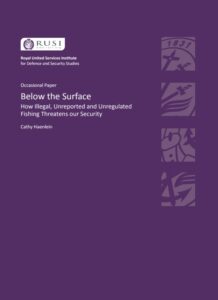A new report commissioned by The Pew Charitable Trusts, presents a comprehensive analysis of how IUU (illegal, unreported, and unregulated) fishing and other maritime crimes intersect, aiming to bring greater attention to the connections between IUU fishing and global security.
The report, written by the Royal United Services Institute (RUSI), emphasizes that many governments consider IUU fishing to be only an environmental crime—not a national or international security issue—and thus have not committed sufficient attention and resources to addressing it. It also argues that IUU fishing takes place on an organised, systematic scale across multiple jurisdictions, and must therefore be recognised as transnational organised crime.
“With this information, officials around the world can better recognize that addressing IUU fishing will help them fight a much broader suite of crimes, and in turn advance a dialogue on how to improve national and regional security as a whole,” Pew notes.
Historically, illegal fishers have easily evaded detection and capture with help from a battery of legal loopholes and complicit actors, including governments, port officials, and banks. By closing each gap in the system—from vessel identification and port controls to accountability by governments that issue registration flags for fishing—the international community should be able to greatly reduce maritime crime. That work is well underway, with successful efforts by Interpol to target IUU fishers, the increasing effectiveness of the Port State Measures Agreement, and improvements in satellite monitoring of the seas.
Recommendations
This paper makes the following recommendations for governments, NGOs and international agencies looking to address the security dimensions of large-scale IUU fishing:
- Recognise large-scale IUU fishing as transnational organised crime : There is a critical need for policymakers and practitioners to treat high-volume IUU fishing as more than a fisheries management problem.
- Recognise large-scale IUU fishing as ‘convergence crime’: Awareness that large-scale IUU fishing commonly occurs in conjunction with other crime types must increase.
- Strengthen domestic legislation : States must strengthen fisheries legislation and harmonise all other relevant laws, such that penalties and the likelihood of their application create real deterrence.
- Strengthen international responses : International-level reform is required to ensure that IUU fishing is recognised under UNTOC, conferring binding obligations on 179 states to cooperate on law enforcement action.
- Strengthen monitoring and enforcement : Capacity building to interdict those engaged in large-scale IUU fishing and associated crimes must be provided.
- Bolster information sharing : Overlaps between IUU fishing and other crimes challenge the common separation of national fisheries management and policing agencies.
- Expand regional approaches and partnerships : Promising initiatives already underway must be more fully resourced and prioritised.
- Bolster efforts to prevent fish laundering : More states must be persuaded to ratify the Food and Agriculture Organization’s Agreement on Port State Measures to Prevent, Deter and Eliminate IUU Fishing, to ensure that no port is used as a shelter for non-compliance.
- Expand multilateral initiatives : In light of its organised and poly-threat nature, the priority assigned to large-scale IUU fishing under multilateral maritime security initiatives should increase.
- Follow the money : Financial investigation tools should be used to reveal ownership information, uncover money laundering and tax fraud, and make strategic arrests of the true beneficiaries of high-volume IUU fishing.
- Prosecute under alternative legislation : Crime convergence provides options to arrest and prosecute perpetrators using laws other than those relating to fisheries.
- End use of flags of convenience : This could be achieved by encouraging flag-of-convenience states to close registries, by requiring coastal states not to issue licences to flag-of-convenience vessels, and by pursuing action by regional fisheries management organisations and international bodies.
Explore more by reading the full report:































































